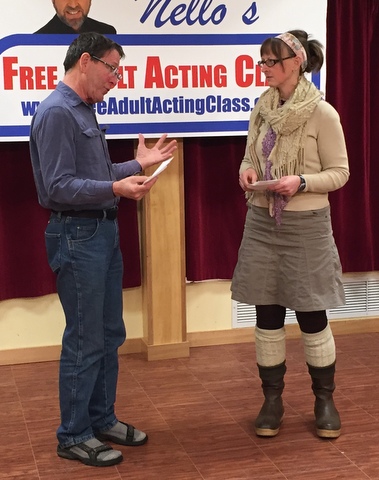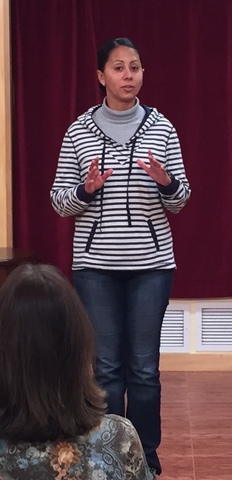Activities
A sequential listing of the usual events that take place
during a typical session of the Free Adult Acting Class.
These class activities are continually expanding and evolving
to fulfill the needs and suggestions of FAAC Attendees.
Unless otherwise noted, all scripted material used in the Free Adult Acting Class
is written & copyrighted by Nello Bottari.

We start class immediately at the scheduled time,
but you may arrive late and/or leave early.
It's totally up to you.
We've adopted a true free-style format
to the proceedings!
Just as people are different, each FAAC is different.
You never know what the next moment will bring!
We laugh, we cry, we have a great time throughout.
However, roughly, in sequence, time permitting,
these are the scheduled activities:
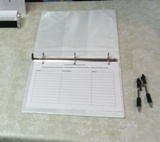
FAAC Guest Book
Upon arrival at class, you are invited to enter
your name, email address and phone number in the FAAC Guest Book.
For more information, click on the Contact link above.
Please pick up a free-to-keep copy
of the FAAC Info-Packet and a pencil.
Then find a comfy seat!
Opening Announcements
At the beginning of class, I introduce myself
and briefly convey general information about the class.
FAAC Info-Packet Overview
I briefly summarize the contents of the FAAC Info-Packet
and deliver any up-to-date announcements.
After the FAAC Info-Packet Overview,
I introduce and explain Main Topic Readings.
Main Topic Readings
These readings are based on the Main Topic Points
for that particular class contained in the FAAC Info-Packet.
Usually, in seated sequence, I have Attendees read out loud
the bullet points for each sub-topic heading.
At the end of each segment,
I may highlight certain points with more detail.
Throughout the Main Topic Readings,
I solicit any questions or comments from Attendees.
After the Main Topic Readings,
I introduce and explain Attendee Introductions.
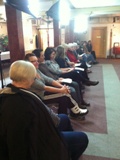
Attendee Introductions
Totally voluntarily, I invite each Attendee
to introduce themselves to the other Attendees and give:
1. Their name
2. Their city of residence
3. Their theatre experience
4. Their personal goals for the class
5. How they learned about the class
We usually start from House Right and go Left,
row by row, until all have participated.
This is always an entertaining, low-key "Ice-Breaker"
that acquaints the class with itself.
(Attendees are encouraged to keep their
individual Introductions to under 30 seconds.)
After Attendee Introductions, I call for Break #1
Break #1
10 minutes.
Restroom and water cooler accommodations available.
Attendees mingle.
Break Time Refreshments
1. Individually-wrapped Fruit & Nut Bars!
2. Individually-wrapped Granola Bars!
3. Sparkling Soda Beverages!
4. Fresh-Brewed Coffee!
5. Crystal Springs Water!
6. Herbal Teas!
7. Fruit Juice!
All absolutely FREE!
1. Donations help defray the cost of Break Time Refreshments.
2. Donations of any size always greatly appreciated!
3. Donation Receptacle on the Break Table.
As always,
please feel free to:
BRING YOUR OWN MEALS
and/orREFRESHMENTS
to class!
BRING or INVITE
anyone who might be interested!
After Break #1, I introduce and explain Random Cards.
Random Cards
Various kinds of performance content
are printed on decks of 3" x 4" cards.
These cards are randomly issued to participants.
On each card is a line or paragraph for the participant
to read to memorize, familiarize, or just cold read onstage.
These cards may be:
1. Thematic to the "Main Topic" of the class,
2. Based on the "Theme of the Month",
3. Purely entertaining in nature.
Main Topic cards: Auditions / M-Cards (Monologue Cards),
Rehearsals /B-Cards (Blocking Cards), Character Development /
E-Cards (Emoting Cards), Stage Presence / T-Cards (Technique Cards),
Performances / P-Cards (Performing Cards).
Other "Theme of the Month"
or "Purely Entertaining" Random Cards include:
"The Plot Thins..." (Murder Mystery clichés)
"Get Me Outta Here!" (Insane Asylum clichés),
"Sshh! They Can Hear You!" (Paranoid Conspiracy clichés),
"You Didn't Hear It From Me, But..." (Rumor & Gossip clichés),
"Break A Leg!" (Theatre Superstitions),
"Here, Turkey, Turkey..." (Overheard at the 1st Thanksgiving), and more!
Other Random Card concepts are in the works...stay tuned!
After Random Cards, I introduce and explain Improv Games.

Improv Games
There are several kinds of improvisational exercises.
These are just a few of them--more in the works!
The main purpose here is to give participants the opportunity
to learn and develop improvisational skills
and gain valuable performing experience before and audience.
Small Group Improv
Arbitrarily, I break up the class into groups of approximately 4-5 people.
Based on the "Theme of the Month", participants immediately, onstage,
devise an improv presentation totally of their own creation.
The improv starts by someone initially saying somethng.
Then, someone in the group propels the action
by adding their contribution to what was just said--and so on.
Participants are encouraged to take their time with their responses
and not talk over each other--enjoy the flow!
Usually, the first things that come to mind
are the most effective--and real!
Express the "Truth" of the scene
--and the audience with love it!
These improv presentations are fairly short
and may not necessarily have an ending.
It's fantastic when it does have a consequential ending,
but I will call the scene if and when it seems
to have played itself out after a reasonable amount of time.
These improv presentations are purely for stirring up the "creative juices"
--getting performance experience--and having fun!
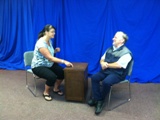
Role-Reversal Improv
A scenario is given to the class and opposing roles
for two participants are assigned.
After the first scene is materially exhausted,
the actors reverse roles and play the scene again.
Very interesting interpretations from different people arise!
(The following scenarios are tentative; subject to change.)
Jan. / “Psychiatrist vs. Patient”, Feb. / “Love Advisor vs. Love-Lorn”, Mar. /
“Lottery Winner vs. Lottery Loser”, Apr. / “Alien vs. Abductee”,
May / “Teacher vs. Student”, Jun. / “Judge vs. Defendant”, Jul. /
“Super Hero vs. Super Villain”, Aug. / “Cop vs. Motorist”,
Sep. / “Boss vs. Employee”, Oct. / “Ghost vs. Paranormal Investigator”, Nov. /
“Executive vs. Panhandler”, Dec. / “Return Clerk vs. Customer”.
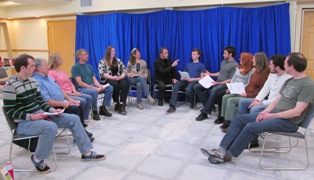
Liar's Club (a.k.a. Psycho-Drama)
We all sit in a circle with everyone facing everyone else.
The Host starts the activity
by addressing a specific person within the circle.
The Host accuses that person of doing
(or not doing) something previously agreed upon.
This person can either:
1. Come up with a good excuse
that absolves them of blame,
2. Blame another person in the circle
for doing (or not doing) something
that prevented the first person
from fulfilling their responsibility.
That second person can take responsibility
for the problem or blame yet a third person
in the circle and so on and so on...
You cannot deny responsibility for an accusation.
You either come up with a good excuse for yourself
or convincingly blame another person in the circle
for preventing you from fulfilling your responsibility.
The improv continues until everyone in the circle
has had at least one opportunity to contribute.
(Liar's Club is usually the last activity of each class.)
After Improv Games, I call for Break #2.
Break #2
10 minutes.
Restroom and water cooler accommodations available.
Attendees mingle.
(Is there any pizza and/or delicious baked goods left?)
After Break #2, I introduce and explain Scripted Scene Study.
Scripted Scene Study
Brief segments of scenes from a variety of high-quality,
published plays are used for this Activity.
We usually use scenes from dramas to focus
on the minute details inherent in every human encounter.
More experienced actors are usually called on to start the scene reading.
This provides an interpretation for less experienced actors
to use as a guide when they perform their reading.
These scenes are usually 2-person, 1 man / 1 woman scenes.
I, the Host, provide directorial guidance before,
during and after each scene performance.
This has become a very popular Activity for regular Attendees!
No acting class in Washington state features
this ongoing opportunity for adults
to learn & grow as actors--for FREE!
The Free Adult Acting Class is proud
to provide this important learning experience!
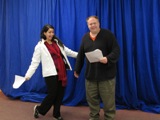
Pat & Chris Comedy Chronicles
The "Androgyny Anthology" continues!
The Pat & Chris Comedy Chronicles are non-gender-specific,
original scripts concerning two individuals of questionable character
getting in and out of predicaments of their own making.
(Approximately 5-6 pages long and 6-7 minutes in performance.)
We first do a "Read-Through Roundabout"
with the entire class serially, line-by-line, reading the script.
Then, random participants perform a cold reading of the script onstage.
(The following titles are tentative; subject to change.)
Jan. / “Regretful Revelers”, Feb. / “Amorous Advisors”, Mar. /
“Luckless Losers”, Apr. / “Fraudulent Foolers”, May / “Moralizing Morons”, Jun. /
“Ditsy Defendants”, Jul. / “Firework Fumblers”, Aug. / “Crazy Campers”, Sep. /
“Errant Entrepreneurs”, Oct. / “Haunted House-sitters”, Nov. /
“Vicious Volunteers”, Dec. / “Sorry Santas”.
After Scripted Scene Study,
I introduce and explain Monologue Memorization.
Monologue Memorization
Selected content is used for implementing
the Memorization Principles & Techniques outlined in the FAAC Info-Packet.
Such content is brief and often in the form of scripted monologues,
inspirational quotes, historical speeches, etc.
Initially, a line-by-line, "Read-Through Roundabout" is conducted
with each participating FAAC Attendee--from their seat--having their turn.
After several repetitions, we progress to the next line in the content
and repeat the progress until we finish.
At some point, those who feel they can recite the entire content from memory
are invited onstage to do so--with prompts allowed--until they can finish without prompts!
After each participant recites the entire content accurately--from memory--without prompts
--the audience cheers in support!
This has become a very popular activitiy!
After Monologue Memorization, I introduce and explain Liar's Club.
Liar's Club
(See explaination above.)
We usually conduct Liar's Club 10-15 minutes prior to the end of class.
Closing Remarks
After Liar's Club, I call for any final questions or comments,
remind Attendees of the next class date--and thank everyone for a great FAAC!
"See you at the next class!"


